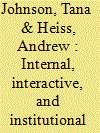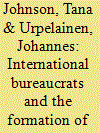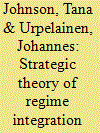| Srl | Item |
| 1 |
ID:
148679


|
|
|
|
|
| Summary/Abstract |
Scholars and practitioners agree that international nongovernmental organizations (INGOs) have become important actors in international relations and policymaking. But an understanding of INGOs’ impact requires a step back, analyzing how and why they behave as they do. We develop a framework that sorts and links relevant factors into three interlocking layers: (1) internal traits of an INGO, (2) interactions between an INGO and other actors, and (3) the overall institutional environment that defines the boundaries of INGO action. To demonstrate the merits of the framework, we review and analyze Internal Affairs by Wendy Wong, The Opening Up of International Organizations by Jonas Tallberg et al., and Borders among Activists by Sarah Stroup. Locating each book within its intended scholarly context, we evaluate contributions to individual layers in our framework. We also examine ties among the books, examining how each work implicitly treats other layers. By uniting internal, interactive, and institutional factors into a holistic framework, we reveal links within existing work on INGOs and illuminate promising avenues for future work about these important actors.
|
|
|
|
|
|
|
|
|
|
|
|
|
|
|
|
| 2 |
ID:
131489


|
|
|
|
|
| Publication |
2014.
|
| Summary/Abstract |
Bureaucrats working in international intergovernmental organizations (IGOs) regularly help states design new IGOs. Sometimes international bureaucrats possess limited discretion in institutional design; sometimes, they enjoy broad discretion. In fact, they gain discretion even when they openly oppose state preferences. This contravenes conventional thinking about delegation: discretion should decrease as preference divergence between states and international bureaucrats increases. We develop a principal-agent theory of how much discretion states grant to international bureaucrats in the design of new IGOs. This is novel: while principal-agent theories of international delegation are common, scholars have not analyzed principal-agent relationships in the creation of new IGOs. We argue that even an international bureaucracy that disagrees with states' design preferences may enjoy substantial design leeway, because of states' need for bureaucratic expertise. In developing this argument, we employ a formal principal-agent model, case studies, and an original data set.
|
|
|
|
|
|
|
|
|
|
|
|
|
|
|
|
| 3 |
ID:
115314


|
|
|